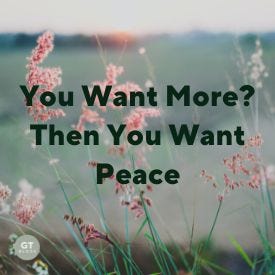When you research a book, it’s sometimes astonishing to see something that in hindsight looks so obvious but for whatever reason, you’ve previously been blind to. That’s what happened to me when I began writing this chapter on peace. The central importance of peace, the glory of peace, and the prophetic power of peace is all over Scripture, but I’ve never valued peace the way Scripture does, perhaps in part because I didn’t know how to get there. This week we’ll look at why pursuing peace is so important. Next week, in the second half of the chapter, we’ll explore how to embrace it.
In all honesty, this chapter has been life-changing for me, impacting me practically in a way that few other of my writings have done. I hope it’ll have the same impact for some of you.
3
Unlearning Restlessness
Learning the True Path to Peace
Perhaps one of the biggest blind spots in the church today is that we are relative strangers to peace. We don’t know what it is, and we don’t value it. If we understood its power and its worth, we would scour ancient libraries trying to find it.
We have a superficial notion of peace at best, but it is entirely a worldly notion. That’s what we must unlearn. If you think peace is dependent on a pain-free life, having enough money stored away for a few decades, a spouse that loves you, children who appreciate you, parents who are proud of you and a vocation that makes others respect you, then that’s what you’ll chase after to find peace. Withhold even one of those, and the net result?
Agonizing anxiety.
Withhold a couple? Perhaps bitterness. Maybe even despair.
If you think all or even most of the above are necessary for peace, you’ll never have peace, and you’ll be helplessly adrift on the ocean of life because you can’t control whether you feel pain or how others treat you or view you. You just can’t.
Keep reading with a 7-day free trial
Subscribe to Simply Sacred with Gary Thomas to keep reading this post and get 7 days of free access to the full post archives.




